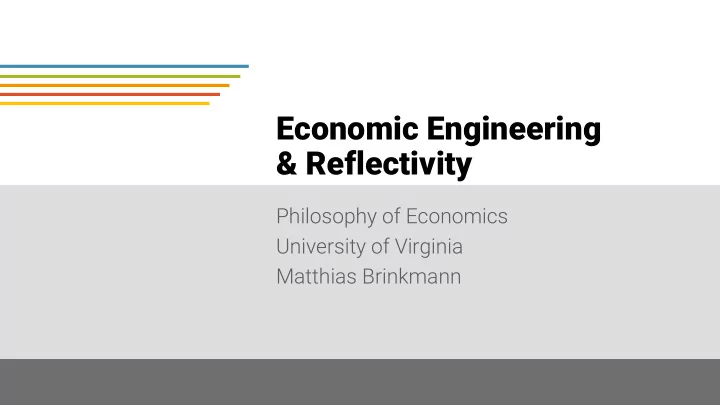

Economic Engineering & Reflectivity Philosophy of Economics University of Virginia Matthias Brinkmann
Contents 1. FCC Auctions 2. Reflectivity 3. The Effects of Studying Economics 4. Looking Back & Forward 29/10/2018 Engineering & Reflectivity 2
Guala on FCC Auctions • Auction theory could not tell economists which design would be optimal (nor can the chosen design be theoretically proven to be optimal) • However, concepts from game theory were used (backward induction, Nash equilibrium, utility maximisation, etc.), and partial solutions offered • Many rules of thumb: higher entry costs scare away opportunistic bidders, more transparency diminishes Winner’s curse , etc. • Factors never predicted by theory play a role (e.g., social signals, cycles, price bubbles) • Many different roles for experiments: testing, comparing, exploring, simulating, finding practical obstacles 29/10/2018 Engineering & Reflectivity 3
Guala’s Upshots (474-5) 1. Scientists did not follow an instrumentalist model in understanding the FCC auctions “Bidders’ reactions to possible strategic situations must be analysed in the light of realistic cognitive capacities at the individual level. One cannot just presume that buyers behave ‘as if’ they were rational.” (474) 2. The assumption of rationality could often be assumed to be fulfilled — because professional game theorists were involved! “[D] ue to the partly self-referential character of social concepts, for the construction of a stable and reliable socio-economic mechanism to be possible at all, adequate self- perpetuating mechanisms must be set in place.” (475) 3. Reliable mechanisms in human behaviour can be found, but they are rare, and must be created very carefully 29/10/2018 Engineering & Reflectivity 4
Contents 1. FCC Auctions 2. Reflectivity 3. The Effects of Studying Economics 4. Looking Back & Forward 29/10/2018 Engineering & Reflectivity 5
Example: Bank Run rumours of depositors X is in financial withdraw financial trouble at money from X trouble bank X • This is an example of a self-fulfilling prophecy • It does not matter at some point whether X is in financial trouble; what matters is whether people believe that X is in financial trouble 29/10/2018 Engineering & Reflectivity 6
Example: Black/Scholes/Merton B-S-M model B-S-M sell Options on B-S-M develop sheets with market are describes how a theory of their model priced rational traders optimal option would price prices to according to pricing options traders B-S-M model • Economic theory itself can have an impact on reality • Black-Scholes-Merton developed a theory of option pricing; their theory was consciously followed by traders • Counterexplanation: their model was successful because it correctly described rational prices; prices would have converged to B-S-M prices at some point 29/10/2018 Engineering & Reflectivity 7
MacKenzie 2007, 61-2 29/10/2018 Engineering & Reflectivity 8
Reflectivity Social & Economic Reality Trades & Market Interactions, Political Regulations, Social Norms & Expectations, etc. observation action Economic Theory & Beliefs Theories about the economy, rational and irrational behavior, expectations for the behavior of others, explicit/implicit value assumptions, etc. 29/10/2018 Engineering & Reflectivity 9
Contents 1. FCC Auctions 2. Reflectivity 3. The Effects of Studying Economics 4. Looking Back & Forward 29/10/2018 Engineering & Reflectivity 10
The Effects of Studying Economics The result is from Marwell, Gerald, and Ruth E. Ames. “Economists Free Ride, Does Anyone Else? Experiments on the Provision of Public Goods.” Journal of Public Economics 15, no. 3 (1981): 295 – 310. Comparison : your average contribution in the class experiment was 37%--although only 23% if you exclude the last five rounds. Potential Problems with Study : high schoolers vs graduate students; no correction for gender disparities Alternative Explanation : self-selection 29/10/2018 Engineering & Reflectivity 11
Marwell/Ames 1981, 308-9 Two questions we asked of subjects concerned ‘fairness’ […]. One asked what they thought a fair investment in the group exchange would be. The other asked whether they were ‘concerned with fairness ’ in making their own investment decision. There was surprising unanimity of thought regarding what was considered fair [amongst non-economists]. [For noneconomists,] we found that more than three out of four thought that ‘about half’ or more of a person’s resources should be contributed […]. Comparisons with the economics graduate students is very difficult. More than one-third of the economists either refused to answer the question regarding what is fair, or gave very complex, uncodable responses. It seems that the meaning of ‘fairness’ in this context was somewhat alien for this group. Those who did respond were much more likely to say that little or no contribution was ‘fair’. 29/10/2018 Engineering & Reflectivity 12
Further Reading • Frank, Robert H., Thomas Gilovich , and Dennis T. Regan. “Does Studying Economics Inhibit Cooperation?” Journal of Economic Perspectives 7, no. 2 (1993): 159 – 71. Survey broadly supporting the Marwell/Ames result • Frey , Bruno S., and Stephan Meier. “Are Political Economists Selfish and Indoctrinated? Evidence from a Natural Experiment.” Economic Inquiry 41, no. 3 (2003): 448 – 62. A clever study claiming that economics does not make you selfish — the supposed effect can be explained through self-selection amongst students 29/10/2018 Engineering & Reflectivity 13
Contents 1. FCC Auctions 2. Reflectivity 3. The Effects of Studying Economics 4. Looking Back & Forward 29/10/2018 Engineering & Reflectivity 14
Course Structure Title Topics Area of Economics Example 1 Explaining through Models Falsification, Instrumentalism vs Realism, Microeconomics Hotelling Models & Unrealistic Assumptions, Explanation 2 Macroeconomics and Programmes/Paradigms & Revolutions, Macroeconomics Friedman Crisis Scientific Progress, Financial Crisis 3 Economics in Practice Causation, Capacities, Ceteris Paribus, Empirical Economics Acemoglu et al. Instrumental Variables, Experiments 4 Rational and Animal Rationality, Bounded Rationality, Irrationality, Decision Theory & Harsanyi, Spirits Practical Reason, Nudging Behavioural Econ. Thaler 5 Individual and Common Fact-Value Distinction, Utility, Preferences, Welfare Economics Landes/Posner Good Welfare, GDP, Happiness 29/10/2018 Engineering & Reflectivity 15
Recommend
More recommend